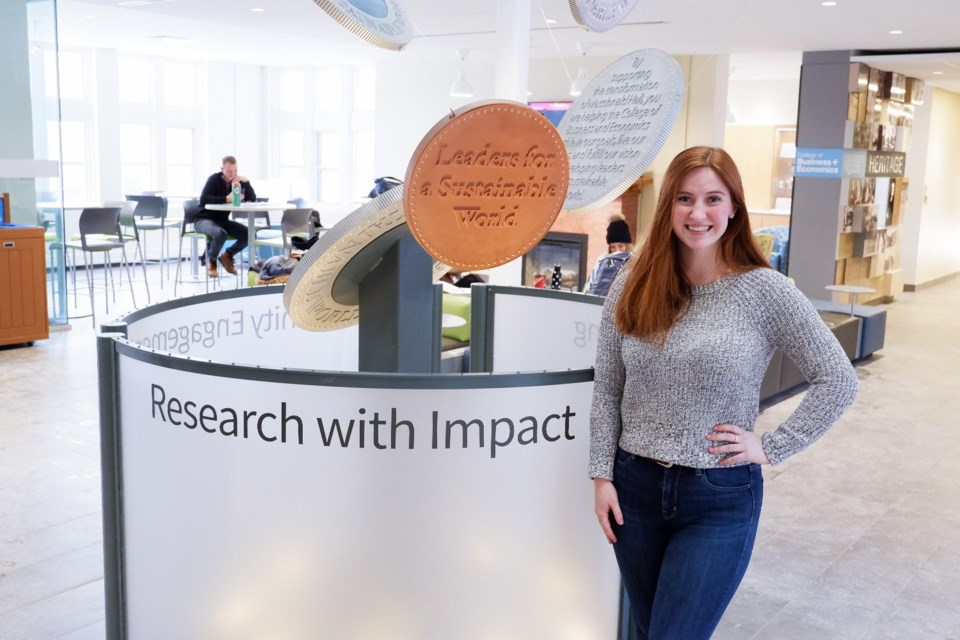The University of Guelph is taking a unique approach to reducing plastic waste on campus.
The ICON classroom is an interdisciplinary learning environment where students find real solutions to real-world problems.
A classroom that is first of its kind in the University. Students from all programs and year of study work together and are encouraged to build upon the knowledge across different academia.
The course was created by integrated biology professor Shoshanah Jacobs computer science associate professor Daniel Gillis.
“This is not only a social justice action. Not only a petition. No. We're helping to do the work," says Jacobs.
“None of us are really lecturing. We developed a number of activities and exercises that the students can do that will help foster their teamwork skills and their ability to communicate better,” says Gillis.
He says there is a focus on cross-disciplinary conversations where students communicate with other students outside their discipline who don't speak the same academic language as they do.
“Someone in mathematics is probably not going to come up with the solution for climate change but people working together with all different disciplines could,” says Gillis.
According to research by Toronto-based environmental watchdog organization Environmental Defence, less than 11 per cent of the plastic we use in Canada actually gets recycled. Their research says that 10000 metric tonnes of plastic get dumped into our Great lakes every year.
Eight million metric tonnes of plastic enters the oceans globally per year. Canada uses 2.5 billion litres of water annually and hands out one billion single-use plastic bags per year according to Waste Reduction Canada.
The problem that the Environmental Defence identifies is that there is no national solution. There are no laws in place that dictate how plastic should or should not be used. It is left to the municipalities in each province except British Columbia.
Jacobs says the University of Guelph hopes to solve this problem by creating an appropriate framework with a step-by-step process on how to tackle the problem of single-use plastic that any high institution in Canada or the world might find useful.
The class will be rolled in three semesters. While each student takes the ICON class for one semester, they pass on the work for the students in the next semester and the work progresses as a team effort in a transdisciplinary environment.
The first semester will be about awareness and will include a plastic audit in the university to learn about the amount of plastic the university is using to reduce the demand for it.
The second semester is about replacement, where the focus is on alternatives to plastic or eliminating the need for plastic altogether. The third semester is to roll out a step-by-step process that can be executed.
“It is wonderful it's going away from the lecture. It’s more of incorporating the students initiative into the course so that they can really look at the problems and figure it out for themselves,” says Christine De Nuovo, a University of Guelph graduate.
Nuovo created a powerful artwork called “450 Years to Forever,” which was on display in the Royal Agricultural Winter Fair in Toronto in 2018.
Vuono’s artwork was a tall structure with cleaned and used single-use plastic going in different directions. She says she attempted to illustrate how plastic is everywhere and is going everywhere in the environment and when single-use plastic is cleaned, it is like new and can be used again.
“As an artist, I find that the more voices that are singing not the same songbook, the better magnified that message is,” says Du Vuono about the ICON class.
“If you have engineers and artists, biologists and chemists and computer designers all saying the same thing, It means that its a bigger push to create something that is tangible and longlasting.”
The U of G eliminated plastic straws and bags from their campus entirely in the Fall of last year. This was an idea brought to the sustainability department by students.
Jacobs and Gillis hope that the ICON class can continue to bring changes on campus and find solutions to deal with the complicated consequences of using single-use plastic.
“It's a big change in the fact that it's starting a change. It’s getting the idea out that we want to make a change at Guelph,” says Erin McCarthy, a student of the ICON class studying commerce in her fourth year.
“It's the first step which is always the biggest step, and then everything else will just fall into place.”
